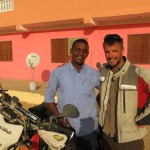 Once on the dock, we drag our luggage to the direction of the Sudanese customs. Mazar, our fixer on the Sudanese side, had already informed us that he would wait for us there. It is warm and the bags seem even more heavy than they already were. Sweaty and with a red hot face we arrive at customs.
Once on the dock, we drag our luggage to the direction of the Sudanese customs. Mazar, our fixer on the Sudanese side, had already informed us that he would wait for us there. It is warm and the bags seem even more heavy than they already were. Sweaty and with a red hot face we arrive at customs.
There we meet Mazar, a young, busy guy with a cheerful face and a contagious laugh. He wears neat trousers, black shoes and a blue shirt. He welcomes us to Sudan, puts our passports in his briefcase and asks us to follow him. Then it suddenly goes very quick. Before we know it our luggage is checked, we have a stamp in our passports and we sit in the back off an old Landrover pickup that brings us to a hotel.
We have not seen the motorbikes yet. Yes, a red-white glimpse in the distance, but no more than that. Our boat was delayed and the customs office has now already closed. All the administrative stuff concerning the bikes will have to wait until the next day. So we have to wait another night and then we will know how the engines have endured the journey.
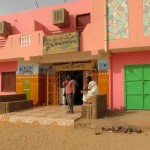 Mazar has booked us a room in the pink Cangan Hotel, which is said to be the best hotel in Wadi Halfa. He has booked one of the better rooms, with a private bathroom. Once in the room, it shows that this sounded better than it actually is. Let’s say that the room meets the ’African Standard’: a door that does not close, outlets of which the wires are hanging out of the wall, a floor full of pink paint daubs, a closet with a broken mirror, a dip in the mattress, stains on the cushions, a toilet that does not flush and a cold shower that sometimes works and sometimes does not. Fortunately, we are quite used to this now.
Mazar has booked us a room in the pink Cangan Hotel, which is said to be the best hotel in Wadi Halfa. He has booked one of the better rooms, with a private bathroom. Once in the room, it shows that this sounded better than it actually is. Let’s say that the room meets the ’African Standard’: a door that does not close, outlets of which the wires are hanging out of the wall, a floor full of pink paint daubs, a closet with a broken mirror, a dip in the mattress, stains on the cushions, a toilet that does not flush and a cold shower that sometimes works and sometimes does not. Fortunately, we are quite used to this now.
When there is water, we both manage to take a quick shower after which we go to the restaurant for chicken and salad. We meet Volker and Mülle, two Germans who drive their motorbikes from Cape Town to Cairo (blog). Mülle rides a Honda Africa Twin, the type of motorbike that Peter has left at home. Like Peter, Mülle appears to be a true ’Twin-lover’. The remainder of the evening we talk about motorbikes and share exciting stories about Africa.
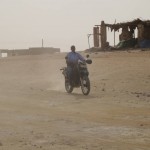 The next morning the moment is there: we can pick up the motorbikes! In the back of the Landrover taxi we bounce over the sandy roads to the port. I cannot wait to be back on my own bike again. Mazar, again dressed in neat trousers and a blue shirt, rides behind us on his motorcycle. His briefcase tightly clamped between his leg and the tank and his eyes half-closed against the dust.
The next morning the moment is there: we can pick up the motorbikes! In the back of the Landrover taxi we bounce over the sandy roads to the port. I cannot wait to be back on my own bike again. Mazar, again dressed in neat trousers and a blue shirt, rides behind us on his motorcycle. His briefcase tightly clamped between his leg and the tank and his eyes half-closed against the dust.
Once in the harbor, we give our papers to Mazar. Volker and Mülle have now also arrived in the harbor with their fixer. We see the two fixers disappear in the customs office and then the long wait begins. The four of us stand in a corner of the harbor area and continue talking where we left off the previous night. The usual motorbike talks about tire pressure, oil usage and broken petrol pumps. Around us the harbor is getting more and more busy. The boat for Egypt only departs in the beginning of the afternoon, but the first passengers already gather in the port area. Again with many large, heavy suitcases.
It takes at least three hours, until after lunch of the customs staff, before we get permission to go to the barge on which the engines are still waiting for us. The closer we get to the boat the more clearly we can distinguish two motorbikes. They stand next to each other on the deck, just where we left them, but now with a thick orange rope on, over, under and wrapped around them. They were certainly locked tightly during the trip.
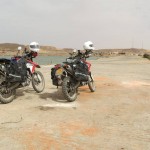 The front of the boat is mored to the dock, this way it is impossible to drive off the motorbikes. After some consultation with the captain, the ship is turned and laid parallel to the quay. Then a structure is built with a pontoon, scaffold planks and some pallets to take of our bikes and put on the motorbikes of Mülle and Volker. Once we are on the barge we free our bikes from the orange rope. They look good and all our stuff is still on the bikes. Fortunately, they have survived the trip. When the captain then hands over our keys, our relief is complete. With the help of the crew Peter takes of the bikes and safely parks them on Sudanese soil.
The front of the boat is mored to the dock, this way it is impossible to drive off the motorbikes. After some consultation with the captain, the ship is turned and laid parallel to the quay. Then a structure is built with a pontoon, scaffold planks and some pallets to take of our bikes and put on the motorbikes of Mülle and Volker. Once we are on the barge we free our bikes from the orange rope. They look good and all our stuff is still on the bikes. Fortunately, they have survived the trip. When the captain then hands over our keys, our relief is complete. With the help of the crew Peter takes of the bikes and safely parks them on Sudanese soil.
Then it is the turn of Volker and Mülle to put their bikes on the barge by the same shaky construction of pallets and scaffolding planks. The captain, another man than we had met in Aswan, had not been so happy with the place where our bikes had been. It had been almost impossible to throw out the anchor, because the winch was blocked by the bikes (just like we feared!). Mülle and Volker therefore have to do it the hard way: drive along the edge (on the quay side), take the bikes over a 50cm high metal threshold, then turn tightly twice and finally park along the edge (on the waterfront). The route that we still had deemed impossible, they now have to take with their much larger bikes.
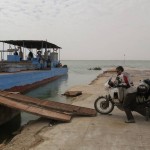 Volker is the first to try. With the help of the crew his Honda Dominator is lifted over the thresholds and eventually parked on the other side of the ship. It only just fits. Mülle had hurt his foot in a fall earlier and is struggling to move his heavy bike. Peter knows how to handle the Africa Twin and -with the help of the crew- he puts the bikes in the right place on the barge. It definitely is something else, such a 250kg weighing Africa Twin compared to our CRFs of 150 kg. (Mülle would later write in his blog that what Peter was only too glad to help to be able to have an Africa Twin in his hands again and I think he was right 😉 )
Volker is the first to try. With the help of the crew his Honda Dominator is lifted over the thresholds and eventually parked on the other side of the ship. It only just fits. Mülle had hurt his foot in a fall earlier and is struggling to move his heavy bike. Peter knows how to handle the Africa Twin and -with the help of the crew- he puts the bikes in the right place on the barge. It definitely is something else, such a 250kg weighing Africa Twin compared to our CRFs of 150 kg. (Mülle would later write in his blog that what Peter was only too glad to help to be able to have an Africa Twin in his hands again and I think he was right 😉 )
With the motorbikes on the quay, Mazar can complete the paperwork. We see him with enter the customs office with his briefcase and walk out a little later with stamped Carnets. We are done, great! After some bizarre events with Kamal in Egypt, Mazar was a welcome surprise. With him, we knew exactly what we paid to whom and why. No frills! And all that with a nice chat and a contagious laugh. A great way to start a new country.
It is late in the afternoon when we say goodbye our new German friends and finally drive our motors to the hotel.
The next morning we do some shopping at the local supermarket and we find gasoline to refuel. The latter is not obvious in Sudan. Because of the conflicts in (neighboring country) South Sudan and the poor accessibility of the oil fields there, it is hard to get gasoline in thi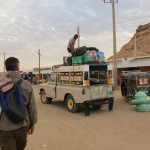 s corner of Africa. We already noticed that in Egypt, but understand that the scarcity is even greater in Sudan and Ethiopia. To avoid getting stuck without petrol, we fill up wherever we can, even if it is only a few liters. Our motors do 3,3 liter on 100km, so every liter is yet again 30km further, perhaps to the next fuel station.
s corner of Africa. We already noticed that in Egypt, but understand that the scarcity is even greater in Sudan and Ethiopia. To avoid getting stuck without petrol, we fill up wherever we can, even if it is only a few liters. Our motors do 3,3 liter on 100km, so every liter is yet again 30km further, perhaps to the next fuel station.
At the end of the morning, later than usual, we leave Wadi Halfa. Once we drive out of town, we are immediately in the desert. Although the road seems to run right along the river on the map, that green delta is nowhere to be seen. Around us the land is arid, dry and dusty. It is quite warm and the air vibrates above the long straight asphalt road. Not far from Wadi Halfa we meet the first cyclists. The French family is cycling against the wind on to one of the hills. Father in front with the two youngest boys in his cart, the eldest son on his own bike behind him and mom as red lantern at the back. On top of the hill we wait for them. We chat, fool around with the boys and share some tips. It is a special trip they are making with their children and a meeting that I will remember for a long time (blog).
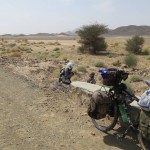 Not much later, we meet up with two of the Chinese cyclists we had met on the boat. It is lunchtime and they have both found a place in the shade. Their fully packed bikes parked along the side of the road. Like Tulsi (the Chinese cyclist we encountered in Egypt) they both have a fishing rod and a guitar(!) with them on the bike. They are on their way to a village about 60km away where predominantly Chinese live.
Not much later, we meet up with two of the Chinese cyclists we had met on the boat. It is lunchtime and they have both found a place in the shade. Their fully packed bikes parked along the side of the road. Like Tulsi (the Chinese cyclist we encountered in Egypt) they both have a fishing rod and a guitar(!) with them on the bike. They are on their way to a village about 60km away where predominantly Chinese live.
Africa is currently being flooded by Chinese. Not only by cycling Chinese tourists, but mainly by miners and road builders. China has entered into contracts with several African countries to derive minerals from the soil. To get the materials for the mining activities in the right place and to transport minerals, the Chinese are building new roads throughout Africa. Along our route there are Chinese settlements everywhere. The feelings about the Chinese presence are mixed and sometimes downright negative. While it is great that the African roads are being paved, the quality of the paved roads is often very poor, as are the conditions under which African workers are employed by the Chinese. Also the “cheap plastic crap” they take is not appreciated by everyone. Not to mention the fact that valuable minerals from the African soil are taken to Asia. For our cycling Chinese friends it only offers advantages, because they cycle on a new road straight to a delicious plate of rice to celebrate the Chinese new year in a few days.
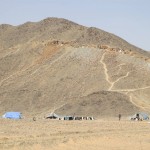 Apart from the bikers there is little traffic on the road. Just a handful of donkey carts, mopeds and here and there a stray tuktuk. The only other road users are the buses, which are notorious! The Sudanese bus leaves according to an extremely tight schedule, whereby passengers are promised to reach their destination within a record time. If the driver arrives at his destination too late, he gets a fine and in case of serious delay he may even lose his job. As a result, the bus drivers push their buses through the country at mind-blowing speeds of up to 160 km/h. They all have new Chinese buses, which are extremely quiet. And that is particularly annoying because as we do not hear them those giant busses are suddenly next to you. That is not even the worst part. It gets really exciting when they ride toward you while they are taking over other traffic! They just drive on and do not move an inch. We needed to get off the road three times to avoid a frontal collision. Idiots!
Apart from the bikers there is little traffic on the road. Just a handful of donkey carts, mopeds and here and there a stray tuktuk. The only other road users are the buses, which are notorious! The Sudanese bus leaves according to an extremely tight schedule, whereby passengers are promised to reach their destination within a record time. If the driver arrives at his destination too late, he gets a fine and in case of serious delay he may even lose his job. As a result, the bus drivers push their buses through the country at mind-blowing speeds of up to 160 km/h. They all have new Chinese buses, which are extremely quiet. And that is particularly annoying because as we do not hear them those giant busses are suddenly next to you. That is not even the worst part. It gets really exciting when they ride toward you while they are taking over other traffic! They just drive on and do not move an inch. We needed to get off the road three times to avoid a frontal collision. Idiots!
On our way south we sometimes see a glimpse of the Nile and the green fields next to it. Most of the houses in the villages we pass have the same beige color as the sand and are hard to see. The most beautiful building in the villages is usually the mosque, which colored walls tower above the flat roofs of the houses.
In the larger towns where we see motorcycles and tuk ride, we try to buy gasoline again. Often the stations have no fuel and the men have to refer us to another gas station that should have gasoline. In most cases, a man then jumps on his motorbike to take us there. So friendly!
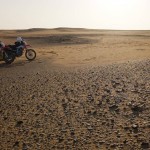 In Sudan, we will mostly bush camp. Partly because there are not very many campsites and hotels, but secondly and more importantly, because we can. The country is not very densely populated, so there is always a place to find where you can stay without being bothered. Other overlanders had told us that even if there are people in the area, they will usually leave you alone. And they were right. When we find a nice place for the tent overlooking the Nile just below Abri, we see some curious faces in the distance, but they just let us go our way. Only after we make contact with them, they approach us to have a chat. And after that chat, they simply leave. Very relaxing and not what we were used to in Egypt.
In Sudan, we will mostly bush camp. Partly because there are not very many campsites and hotels, but secondly and more importantly, because we can. The country is not very densely populated, so there is always a place to find where you can stay without being bothered. Other overlanders had told us that even if there are people in the area, they will usually leave you alone. And they were right. When we find a nice place for the tent overlooking the Nile just below Abri, we see some curious faces in the distance, but they just let us go our way. Only after we make contact with them, they approach us to have a chat. And after that chat, they simply leave. Very relaxing and not what we were used to in Egypt.
On your first day in Sudan we follow the Nile down to Dongola where we buy water, fresh fruit and vegetables. Then we drive away from the Nile and ride on the desert road toward the east to Karima where we can visit pyramids. Once we have left the Nile behind us and ride into the desert the climate immediately changes. It is a lot warmer, even warmer than we had experienced in the Egyptian desert. There is some wind, but it is so warm that it seems as if a blow dryer is constantly blowing hot air in your face. The burning sun and warm air give me a sore throat, a sunburnt red nose and cracked lips. We stop for lunch in the only shady place we can find, but immediately decide to make it a quick lunch. It is too hot even in the shade. Some wind form riding is better, even if it is a warm wind. With sunblock on my face and my buff up my nose, we drive to the east.
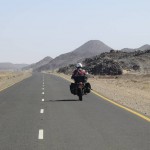 The road is a straight line that disappears into the distance. Along the way, we do not come through villages and we hardly see any traffic. Very boring. We both put on some music and make our way through the warm air. We had wanted to ride to Karima in two days, but when we are halfway it is still so hot that we decide to drive on. It is too hot to put up the tent now. And to think that our cycling friends will travel along this road to the east as well. What a tough ride that will be!
The road is a straight line that disappears into the distance. Along the way, we do not come through villages and we hardly see any traffic. Very boring. We both put on some music and make our way through the warm air. We had wanted to ride to Karima in two days, but when we are halfway it is still so hot that we decide to drive on. It is too hot to put up the tent now. And to think that our cycling friends will travel along this road to the east as well. What a tough ride that will be!
We end up driving until the sun begins to set. When we stop to take a pictures of some camels, we see a path disappear into the desert next to the camels. We turn off the road and follow the path until we find a nice flat area for the tent. As the sun sets, we enjoy a fresh mango and a bag of salty chips. In the last light we pitch our tent and when the sky is filled with stars eat a delicious plate of pasta. After dinner we look for constellations in the sky. It is surprisingly silent. The only sound comes from my phone indicating that I have new whatsapp messages (yes, even in the middle of the Sudanese desert we have full coverage!)
Halfway through the night the wind gets stronger. It shakes our tent up and down. We do not sleep much after that. Once the sun is up, we pack our things and we leave after a quick breakfast in the direction of Karima. It is still early when we arrive at the pyramids. The pyramids are small compared to the p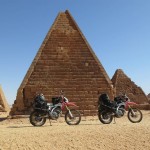 yramids at Giza, but still beautiful. There is no fence around the pyramids, there is no ticket office, there are no ‘guides’ and no souvenir shops, there is nobody. Just us! We park next to the pyramids and take a look at the pyramids at our own pace. Great, Sudan!
yramids at Giza, but still beautiful. There is no fence around the pyramids, there is no ticket office, there are no ‘guides’ and no souvenir shops, there is nobody. Just us! We park next to the pyramids and take a look at the pyramids at our own pace. Great, Sudan!
Distance to Karima : 8,595 km / 5,341 miles





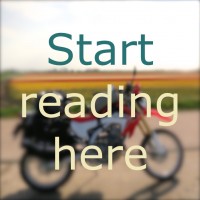
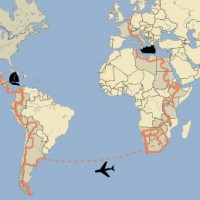
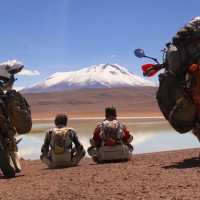
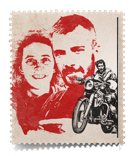
I oversaw it before, but it is one of the most important things in African traffic: Know your place in the picking order. Means: You are just above pedestrians an cyclists and you got absolutely no rights. Break, if you see some bigger car/truck/bus coming from the other side and overtaking someone. They won’t fucking stop for you. But you learned that most probably by now. To know your place in the picking order is essential for survival, to know that you got no rights, as well.
Hoi Peter en Leonie,
Het is echt genieten om te lezen hoe jullie “het aarden beest” bedwingen. Superfijn dat wij het op deze manier allemaal kunnen volgen.
Geniet ervan!
Gr. Jorn en Lonieke
Hi Leonie, hi Peter,
good to read from you again, looking forward to your reports about Ethiopia and Kenya.
Safe travels and may the road be with you!
Mulle
Hallo, Leonie en Peter,. Heb ” even” de laatste drie blogs gelezen. Wat een belevenissen weer! Een genot om te lezen. Nu weer wachten op de volgende. Een hele veilige reis verder, en vooral veel plezier. Groetjes.
Gaaf verhaal weer zeg! En de foto’s zijn ook weer schitterend; super om op deze manier even te ‘terug te zijn’ in Sudan :-D.
xxx
Hoe cool klinkt dat; een fixer!
En die beschrijving over ‘de afrikaanse standaard’voor een hotelkamer klinkt bekend, vooral die verfklodder overal, haha.
Het ga jullie goed, ik kan niet w88 op het blog over Ehthiopie, ben heel benieuwd wat jullie van ‘Leon z’n land’vinden
XXX
Hoi bedankt weer voor dit leuke verhaal!
Liefs Jan&Mariët
Zo…eindelijk weer een blog, begon inmiddels een beetje nerveus te worden!!
In ieder geval gefeliciteerd met je nieuwe sjaal en internetverbinding in de woestijn!!
SUDAN! Geweldig!
Prachtig land met geweldige mensen; heel tof om te lezen dat jullie dat ook zo ervaren hebben!